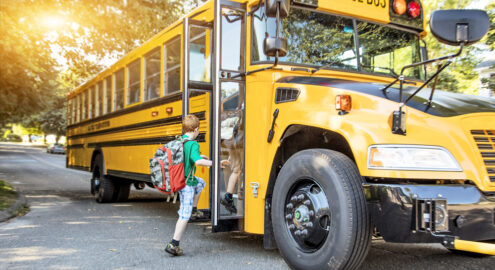Risk
Campus Safety Tips From a Security Expert and Father of a College Freshman

College is in session for the fall semester, which means new students are excitedly settling into their new routines. Their parents and guardians, however, are probably nervous. College campuses have a long history of newsmaking violent incidents, from Kent State to Virginia Tech. How can you keep your kid safe from afar while letting them try out their newfound independence?
I recently dropped my own child off for her freshman year of college. As a security professional, I know the potential risks. Earlier this year at the International Association of Campus Law Enforcement Administrators (IACLEA)’s annual conference, I heard panels about hazing, the online radicalization of students, and the need for more mental health resources.
While I’m just as concerned about safety as the next parent, the good news is that many colleges are proactive about student safety, and provide tools that help parents stay on top of campus news and incidents. Below are some helpful tips that will help you stay informed and keep your kid safe, even if they are several states away.
Keeping your kids safe on campus
1. Download the school’s safety app
Most colleges and universities have a safety app. Encourage your child to download it and install it on your phone as well so that you are notified when an incident occurs on campus. This app should have several features:
Notifications about safety incidents both on and off campus
Safety alerts
A reporting feature that is confidential but not anonymous
A buddy system or safe walking feature that allows a student to request a vetted escort to walk them home at night, or that allows the student to talk to a safety officer while walking home
An “I’m ok” feature that allows students to mark themselves safe during an incident
An “I need help” feature that sends an alert to campus police
Resources like maps, emergency contacts, and procedures
2. Attend orientation
Colleges want you to take an active part in your child’s education and encourage your participation in orientation. At orientation, you’ll be able to meet the campus police, see the campus and learn about the safety resources available to your child.
3. Look at the data
Named for a college freshman who was assaulted and killed in her dorm room in 1986, The Jeanne Clery Disclosure of Campus Security Policy and Campus Crime Statistics Act, or Clery Act, is a federal statute requiring colleges and universities that participate in federal financial aid programs to keep and disclose information about crime and allegations of crimes on and around their campuses.
Every school publishes this information annually, and often on their websites. Read through the report and be sure to discuss it with your child so you’re both prepared for the sorts of incidents that can occur on campus.
4. Know what resources are available for students (and encourage your child to use them)
Colleges and universities offer a range of resources to help your child deal with the stress of being away from home for the first time. Know what these resources are, and make sure your child is aware of them as well. Mental health counseling is an important resource for college students, and should be used without shame or fear of stigma. Encourage your child to check in with a counselor when things start to feel overwhelming.
5. Educate your kid about good habits
No college safety checklist would be complete without a discussion of good safety habits. Teach your child to be aware of their surroundings; they are away from home for the first time in a new place — maybe don’t look at their phone while walking around. Tell them to be careful about what they’re posting on social media, especially if it offers clues about their location.
This is on top of the usual safety tips: don’t walk home alone at night, keep dorm doors locked, be careful about jumping into Ubers without checking who the driver is (we recommend watching the Sami’s Law episode of Hulu’s Death in the Dorms series with them) and if they’re able to drink, watch their drinks as they are poured.
You should have good safety habits as well. Use a family code word, for example, so that if someone attempts to pick up your child at school saying you sent them, they can ask for the code word as confirmation.
6. Communicate
Your child’s move to campus is the first step in growing up. While they do need to learn independence, keep the lines of communication open. Let them know they can come to you whenever they need to ask about a situation or get advice, and make sure they feel safe calling or texting if they’ve gotten themselves into trouble.
Remember: being informed is not helicoptering
Nobody wants to be a helicopter parent. Some of us may remember how uninvolved our own parents were when we attended college for the first time.
However, being involved and informed does not mean you’re a helicopter parent. Your child is in college to grow, and to gain independence, but they still need guidance when it comes to making intelligent and safe choices. If you’re informed, and the lines of communication are open, you’ll be the support they need, even if they’re going to school in a different time zone.
Follow the Circadian Risk blog for more safety and security tips and information.





